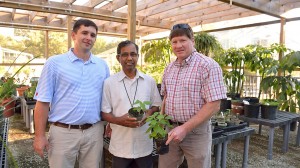
Medicinal plant garden staff members Robert Cooper (left), Lal Jayaratna and Ed Lowe pose for a photo at the garden’s 50th anniversary celebration. Lowe has worked at the garden for 12 years.
OXFORD, Miss. – As a senior research and development horticulturist for the University of Mississippi School of Pharmacy’s Maynard W. Quimby Medicinal Plant Garden, Ed Lowe brings years of farming knowledge to the table.
“Growing up in the Mississippi Delta, I was able to learn a lot about farming and the fundamentals of how it all works,” Lowe said. “Dr. Charles Burandt (former research botanist for the National Center for Natural Products Research) hired me in 2003 to work at the medicinal plant garden based on my 10 years of farming experience as well as my studies in farm management.”
The medicinal plant garden maintains a plant collection that supports drug-discovery efforts with the School of Pharmacy’s Research Institute of Pharmaceutical Sciences. The garden is a vital component of the NCNPR.
Lowe conducts a variety of tasks for the garden, but his first priority is maintaining the living plant collection. The medicinal plant garden has four greenhouses, each of which is maintained by Lowe, research and development botanist Lal Jayaratna and research technician Robert Cooper.
Managing the garden’s inventory is a large task in itself. The work is “very tedious and must be done correctly,” Lowe said.
“Each and every plant that enters the greenhouses is either started from seed or ordered from a nursery,” he said. “Each plant is entered into a laboratory notebook and assigned a number, genus, species, family and common name. A label is then made and put in each pot or next to each plant in the ground. This helps us keep up with the plant until it is harvested.”
Lowe also develops outdoor growing beds during the summer. The beds are where most of the garden’s samples are sourced; therefore, it is important to maintain them by daily watering, fertilizing and weeding, he said.
“Once a plant matures and flowers, we cut the flower, and the upper leaves are removed to create a voucher specimen,” he said. “This will be stored in our herbarium for future reference. The remainder of the plant can then be uprooted for harvest. The root, leaves, stem, bark and twigs are then separated for drying and grinding, then bottled for storage in our repository.”
It is undeniable that Lowe is dedicated to his work at the garden.
“The most rewarding thing about working for the medicinal plant garden is seeing the garden grow each year,” he said. “We receive several different plants from all over the world. It is an honor to be a part of an organization that is doing such important work.”
Lowe and his wife, Rebecca Owens Lowe, have been married for 19 years and have lived in Lafayette County since 1996.